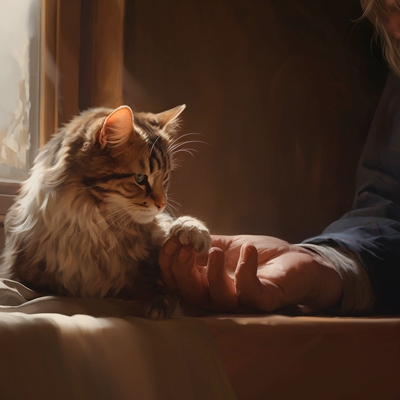The Aging Pet: Your Pet and End-of-Life Care and Decisions:
Summary:
Navigating the end-of-life journey with our pets is an emotional rollercoaster. From recognizing the signs of aging to making the heart-wrenching decisions, every step requires love, understanding, and sometimes, professional guidance. This article sheds light on the various aspects of end-of-life care, offering support and insights to pet owners. Remember, it's not about the number of days but the life in those days. Cherish every moment and know you're not alone in this journey.


- Recognizing the Signs of Aging in Pets
- Understanding the Quality of Life
- Medical Interventions and Treatments
- Emotional Support for Your Pet
- Preparing for the Inevitable
- Making the Difficult Decision
- Memorializing Your Pet
- Seeking Support for Yourself
- The Role of Veterinarians in End-of-Life Care
- Moving Forward: Adopting Again
The journey with our furry companions is filled with wagging tails, purring cuddles, and countless memories. But as the golden years approach, we're faced with the inevitable reality of their life cycle. This article delves deep into the heart-wrenching decisions and preparations surrounding end-of-life care for our beloved pets. Grab a tissue, and let's navigate this together.
Recognizing the Signs of Aging in Pets
As our pets age, subtle changes begin to surface. Their once vibrant coat may start to gray, and those playful leaps might turn into cautious steps. It's essential to be observant and recognize these signs early on. Regular vet check-ups become even more crucial during these years. Not only do they help identify potential health issues, but they also guide how to make your pet's golden years comfortable. Remember, aging is a natural process; with your love and care, your pet can age gracefully.
Understanding the Quality of Life
Quality of life is a term that resonates deeply when discussing end-of-life care. It's not just about the length of life but the joy and comfort in those years. Assessing your pet's quality of life involves observing their daily routines, appetite, mobility, and happiness. There are scales and questionnaires available that can guide you in this assessment. However, trust your instincts. You know your pet better than anyone, and your observations are invaluable.
Medical Interventions and Treatments
As pets age, medical issues can arise. From arthritis to more severe conditions like cancer, it's essential to be informed about the available treatments. Discuss with your vet the potential interventions, their side effects, and the expected outcomes. Sometimes, the best decision might be palliative care, ensuring your pet's comfort rather than aggressive treatments. Always prioritize your pet's well-being and consult trusted professionals for guidance.
Emotional Support for Your Pet
In their twilight years, pets, like humans, seek comfort, love, and reassurance. Their senses might not be as sharp, and the world might seem slightly more confusing. It's our duty to provide them with a safe and loving environment. Spend quality time with them, indulge in gentle play sessions, and offer them their favorite treats. Soft blankets, warm spots, and gentle massages can work wonders. Remember, it's the little things that count. Your touch, voice, and presence can be the best medicine for your aging pet.
Preparing for the Inevitable
It's a topic we often shy away from, but preparation can provide peace of mind during tumultuous times. Consider setting up a pet trust or will to ensure your pet's needs are met if they outlive you. Discuss with family members or friends who might be willing to care for your pet. Additionally, research pet cremation or burial services in your area. Knowing you have a plan can ease some of the anxieties associated with the end-of-life journey.
Making the Difficult Decision
One of the most complex decisions a pet owner can face is when or if to euthanize. It's a deeply personal choice, often marred with guilt, doubt, and grief. Consult with your veterinarian, who can provide insights into your pet's health and quality of life. Remember, it's about alleviating suffering. If your pet is in chronic pain or has a diminished quality of life, euthanasia might be the kindest option. Take time, seek counseling if needed, and lean on loved ones for support.
Memorializing Your Pet
The end of a journey doesn't mean the end of memories. Memorializing your pet can provide closure and be a beautiful tribute to your furry friend. Consider creating a scrapbook with photos, toys, and mementos. Planting a tree in their memory or setting up a small memorial spot in your home can also be therapeutic. Some pet owners even opt for memorial jewelry, always carrying a piece of their pet with them. Whatever you choose, let it be a testament to the love and bond you shared.
Seeking Support for Yourself
Grief is a natural response to loss. And losing a pet can be as heart-wrenching as losing a family member. It's essential to allow yourself to grieve and seek support. Join pet loss support groups, consider counseling, or share your feelings with friends and family. Remember, it's okay to cry, it's okay to feel lost, but with time and support, you'll find your way back to the sunny days filled with cherished memories.
The Role of Veterinarians in End-of-Life Care
Veterinarians play a pivotal role in the end-of-life journey of our pets. From providing medical advice to offering emotional support, their expertise is invaluable. Schedule regular check-ups, discuss any concerns, and don't hesitate to ask questions. Veterinarians can guide you on pain management, dietary needs, and the overall well-being of your aging pet. Trust in their knowledge and lean on them during these challenging times.
Moving Forward: Adopting Again
The void left by a pet's passing can be vast. But with time, the idea of adopting again might cross your mind. It's not about replacing your beloved pet but offering another animal a loving home. Take your time, grieve, heal, and consider opening your heart and home to another furry friend when you're ready. Remember, every pet brings its unique joy, and while they can never replace the one you lost, they can undoubtedly carve their special place in your heart.
The bond we share with our pets is immeasurable, and saying goodbye is never easy. As we close this chapter, remember that every moment spent with them was a testament to unconditional love. Cherish the memories, seek support when needed, and know that in time, your heart will heal, making room for new paw prints.


